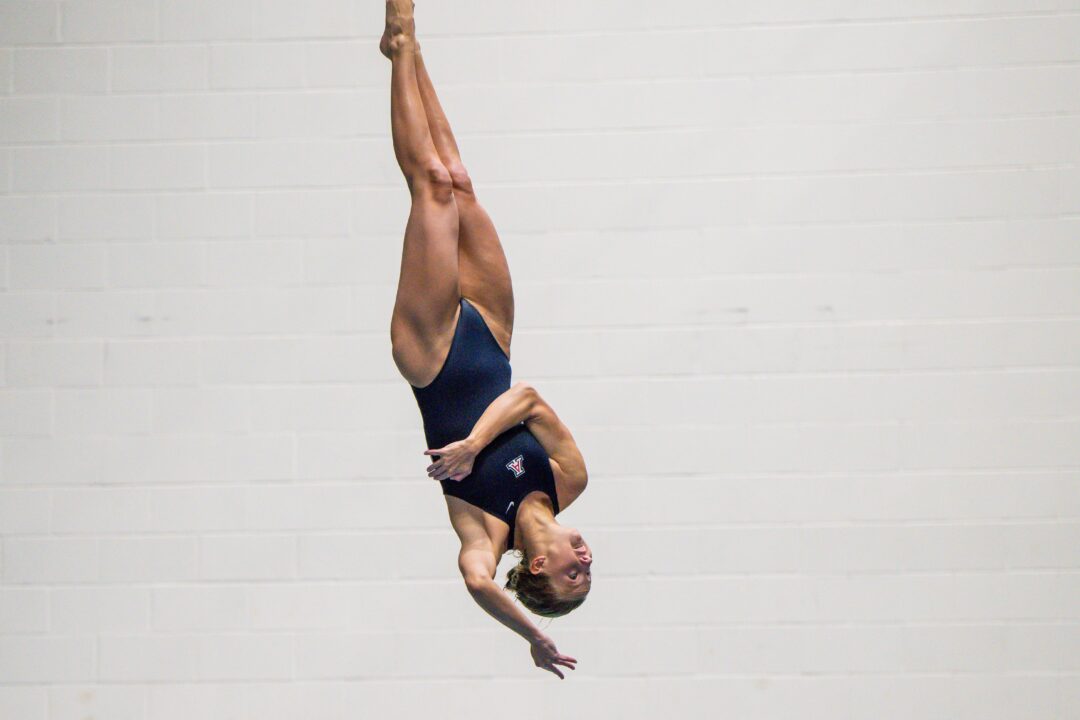Courtesy: Dr. Chelsea Ale.
Opinions in this op-ed don’t necessarily reflect the views of SwimSwam.
Diving is one of the most captivating sports on the Olympic stage. For two weeks every four years, audiences across the globe are mesmerized by athletes launching into acrobatic twists and turns, cutting through the air with elegance and power. And then—silence. The pools empty. The cameras vanish. And the sport once again fades into the background.
What many don’t realize is that behind the scenes, diving isn’t just being ignored—it’s actively deteriorating. Programs are being cut. Coaches are burning out. Athletes are walking away. And one organization meant to guide and protect the future of diving has failed to rise to the challenge: USA Diving.
As someone who has spent nearly three decades in this sport—first as an athlete, then as a coach, and now as a researcher—I’ve seen it from every angle. I’ve coached Olympians, trained youth athletes, and worked with collegiate programs. Recently, I completed a four-month ethnographic study on women in Masters diving. What I discovered was disheartening, but not surprising: there is a complete lack of promotion, support, and long-term vision for the sport of diving—and it starts at the top.
Diving Is Dying Quietly, and USA Diving Is Letting It Happen
USA Diving has become laser-focused on elite performance. Their public promotion, social media content, and resources almost exclusively revolve around Olympic hopefuls or World Championship contenders. While celebrating excellence is important, that narrow focus has come at a steep cost. There is little investment in the broader ecosystem required to keep diving alive: young athletes, collegiate programs, adult competitors, and the coaches and clubs who develop them.
At the Masters level, USA Diving’s neglect is particularly evident. There are only two sanctioned competitions per year, no formal training camps, no support for coaches working with adults, and minimal recognition. In my research, Masters divers reported being shoved into late-night pool slots, denied facility access, and treated as second-tier by their own clubs.
This would be frustrating in any sport—but in diving, it’s especially short-sighted. Masters divers are former NCAA athletes, Olympians, and long-time club participants. They’re the ones with the careers, the means, the loyalty—and often, the checkbooks. USA Diving should be cultivating these relationships, not ignoring them. These athletes are not just participants—they’re potential donors, sponsors, mentors, and advocates. And they are being completely overlooked.
No Support for Collegiate Diving, Despite Relying on Its Athletes
USA Diving doesn’t officially oversee collegiate diving, but it relies heavily on NCAA athletes to fill its elite ranks and Olympic rosters. Despite this, there is no meaningful effort to promote, protect, or grow collegiate diving from the organization. No marketing campaigns. No public support. No effort to engage university administrators or the NCAA to preserve programs.
Compare this to USA Gymnastics, which has actively helped college gymnastics become one of the most exciting and successful properties in Olympic sport. College gymnastics meets regularly fill arenas, earn national broadcast slots, and generate massive fan followings. Diving, by contrast, is barely visible—despite being one of the most-watched Olympic sports.
Collegiate diving programs are being eliminated across the country. While lawsuits, NIL changes, and budget cuts contribute to this, USA Diving’s silence and inaction make it easier. When administrators look at which sports to cut, they look at visibility, alumni support, and relevance. Right now, diving has almost none of those things. And USA Diving isn’t doing enough to change that.
No Promotion, No Pipeline, No Future
You can’t build Olympians without building a pipeline. But USA Diving has failed to support the very coaches and clubs responsible for developing athletes. There are minimal resources for grassroots programs. Coaches are underpaid and under-supported. Facilities are difficult to access. And adult participation is seen as a nuisance rather than an opportunity.
Meanwhile, the marketing of the sport is almost nonexistent. Outside of a handful of elite events, USA Diving does little to promote the sport to the public. There are no national campaigns. No emphasis on storytelling. No push to make diving feel inclusive, fun, or aspirational beyond the Olympic spotlight.
And when the only people who care about diving are the ones already in it, it becomes an easy target for elimination.
There’s Still Time to Save It
Diving is a beautiful, powerful, lifelong sport. It is one of the few Olympic disciplines where athletes can participate from early childhood through late adulthood. My research showed that women in their 40s, 50s, and 60s were not just participating—they were thriving. They found joy, healing, empowerment, and purpose through diving. But USA Diving has done little to recognize or promote that reality.
It doesn’t have to be this way. USA Diving must:
- Invest in visibility and storytelling at every level—not just elite competition.
- Provide tools and education for grassroots and club coaches.
- Launch real engagement campaigns for collegiate and Masters divers.
- Develop and promote diving as a lifelong sport—accessible, welcoming, and exciting for everyone.
A Late Start Is Not Leadership
It’s worth noting that in recent weeks, there have been some indications that USA Diving may be starting to engage in conversations with NCAA stakeholders amid ongoing concerns about program cuts. While that’s a welcome and necessary step, it’s also overdue. Collegiate diving has been quietly suffering for years, and it shouldn’t take a crisis to spark action. Long-term sustainability requires long-term investment—at every level of the sport.
Why I’m Speaking Up
I want to be clear: this message comes from a deep place of love. If it weren’t for diving, I wouldn’t have a single one of my degrees. I wouldn’t have the career, the friendships, or the life I’ve built. Diving shaped me into the person I am today, and for that, I am endlessly grateful.
This isn’t about blame—it’s about accountability. It’s about stepping up for the sport that gave me everything. It’s about doing what I can to ensure future generations get the same chance I did.
Because diving deserves to be seen. It deserves to be supported. And it absolutely deserves to be saved.
ABOUT DR. CHELSEA ALE
 Dr. Chelsea Ale is a professor of Sport Management at the University of Alabama, a former elite diving coach, and President of the U.S. Professional Diving Coaches Association. She holds a Ph.D. in Sport Management and has spent over 25 years in the sport as an athlete, coach, and researcher.
Dr. Chelsea Ale is a professor of Sport Management at the University of Alabama, a former elite diving coach, and President of the U.S. Professional Diving Coaches Association. She holds a Ph.D. in Sport Management and has spent over 25 years in the sport as an athlete, coach, and researcher.

Thank you Dr. Ale, for standing up for diving! A big deterrent to the sport has been insurance companies that have lumped all water sport injuries into the same category. That’s another area that US Diving has failed to address. Like you, my diving career shaped the trajectory of my life, adding dimension, context and appreciation for the way it grows a person – to face fears, challenge limits, and instill flexibility for life’s surprises. There is no greater thrill than ripping through the surface at 35 MPH (I was a platform diver 🙂
As a life-long swimmer and one who was vaguely familiar with the strange fellows flipping around in the deep end while we were trying to get our work done, I’ve never understood why that kind of thing wouldn’t be better suited as an attachment to the gymnastics programs.
Despite being an awesome spectacle, a diver really never syncs with the fish. Given the truly personal nature of their sport and their success, divers just don’t generally cast much of a shadow. They have to stick their tongue on the lead pipe in the freezing cold for all the rest of the kids to take notice.
Seriously, rather than beating the dead horse of collegiate support, strategic negotiations at the grade… Read more »
Without diving, my alma mater wouldn’t have made it to the top 10 at Div. 1 NCAA’s. Also, it’s about the medium, water. Diving absolutely belongs with swimming. It gives swimmers a break in the middle of a meet and is a crowd favorite.
Let’s be honest. No one cares about diving
I care about diving.
DIVING MATTERS!
I see a similar issue that womens sports had and addressed, the sport is not marketed, like all womens sports used to be. Diving is not marketed, and a large part of the blame is on athletic departments. Only a handful of sports are actually given legitimate marketing efforts by departments. Once lawsuits came up over how womens basketball was marketed, the dynamic changed and people started going to those games because they finally saw marketing for it.
Americans like all sports, they have to actually know about them.
Buh Bye – Divers have a future in circus, clown shows, sky diving, cliff diving and pearl diving. No future in NCAA sponsored SWIMMING – start packing yer duffle bags, spongee towelettes and XS parkas.
It’s NCAA Swimming & Diving, your lack of knowledge and literacy is astounding
@MigBike #ANDdiving And I would note that if push came to shove, a diving team would be far less expensive for a university to operate than would be a swim team. So perhaps be careful what you wish for.
They have a blueprint already. Death diving and Red Bull cliff diving bring in viewers and money, cause they don’t treat a scary thing like golf. Shhhhhhh!
Just like swimming, oldheads are keeping the formula back.
Diving needs:
Shot Clock: 15 seconds to execute a dive, every second over 15 is a point deduction
Constant noise, like a free throw. The intense quiet is way worse than a constantly loud student section mixed with music from a band
They need to embrace the scary factor!
It’s a beautiful and fun sport AND …
Jumping off of tall things into water is NOT supposed to be a quiet sport.
Divers all hate the quiet too. Dive practice is loud. Many is the time, where I coach, I’ve seen the swimmers ask the divers how to patch into the Bluetooth PA. I think the judges are the ones that like the quiet.
Nominally at USA meets they assume 20 sec a dive I believe. 8 finalists, 6 dives, 20 sec a dive is 24 minutes. TV makes it longer. 24 minutes is a 1650 and a half, more or less.
Hard to promote growth when diving boards are being taken down. Summer league pools and recreation centers that used to have them are removing them for liability purposes. New pools and builds are looking at the additional costs not only of a deeper tank and foundation settings but also the insurance needed to carry diving apparatus and not having them as part of their build. College campuses I’m sure are sheepish from allowing youth diving onto their campus as well in fear of negligence, accidents and lawsuits that could unfold.
As already covered, there isn’t a lot of bang for your buck at this level unless you have great interest and/or are a one trick pony with access to… Read more »
Yeah, it’s a shame, but real.
Insurance companies won’t underwrite classic summer pool high-dives under many scenarios at all, and it’s far too expensive to retrofit a pool to meet the requirements.
Our club had to take ours down because even though our deep end was 12-feet, the incline up started slightly too close to the diving area.
Too bad – it’s so much fun and a rite of passage for kids to jump off the high-dive along with the crazy Dads showing off for their kids.
Americans discover lack of leadership has consequences, everyone is shocked!
To be perfectly honest I have little faith that changes soon